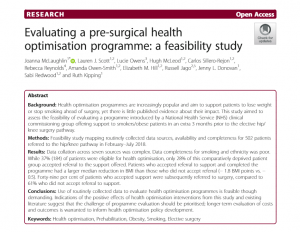How feasible is using routinely collected data to evaluate health optimisation programmes?
23 June 2022
A study published in Perioperative Medicine using routinely collected data to evaluate a ‘health optimisation’ programme, has shown it is feasible but challenging to use such data in this context. The researchers, from the University of Bristol and NIHR ARC West, evaluated Getting Fit for Surgery, a health optimisation programme in Bath and North East Somerset.
Health optimisation programmes vary from region to region, but usually offer support for patients to lose weight or give up smoking ahead of surgery. Getting Fit for Surgery introduced an extra 12 weeks ahead of referral to surgery, during which eligible patients were offered support from a ‘healthy lifestyles’ service. While the health benefits of achieving a healthy weight or stopping smoking are clear, some health professionals are concerned that such policies might also have harmful effects. This could include making access to surgery more difficult for certain groups in society and thus widening health inequalities.
The study team worked with the organisations involved in each part of the health optimisation process, including identifying patients, referring them for weight management or stop smoking support, providing the support, to see what information they routinely collect. The researchers analysed the anonymised information to see how many patients took up the offer of support with weight management or smoking, and whether there was a difference between those who did and not take up the offer of support.
The information available showed that around a third (37 per cent) of hip and knee patients had obesity or were current smokers and were therefore required to wait an extra 12 weeks before surgery. Only three out of ten (28 per cent) of these patients accepted the offer of support to lose weight or stop smoking. Those accepting support lost more weight on average than those who did not (-1.8 body mass index points compared to -0.5), and fewer of these patients went on to have joint surgery (49 per cent vs 61 per cent). The cost of the health optimisation programme was £57 per patient for weight management. These results suggest that health optimisation programmes may have positive effects for patients and reduce their need for surgery. This was particularly important as the health optimisation patients were relatively less affluent than hip and knee patients overall.
Enough data is routinely collected on patients in the health optimisation programme to give commissioners and researchers some useful information about the scale and effects of the programme. However, the research team found that bringing this data together is a complicated and lengthy process due to the number of organisations involved. There was a lot of missing data regarding smoking and ethnicity, and a lack of information on the long-term health outcomes of patients in the programme. Long-term data is important when trying to establish whether the programmes represent good value for money and whether they improve patients’ general health and wellbeing.
Dr Joanna McLaughlin, NIHR Doctoral Clinical Research Fellow at Bristol Medical School, who co-led the research said:
“Health optimisation programmes are increasingly popular among healthcare commissioners, but there hasn’t been much research to show how effective they are. The data needed to answer this question is held by institutions across a local health sector, from smoking cessation services to hospital records.”
Lauren Scott, Senior Research Associate at NIHR ARC West and Bristol Medical School, who co-led the research said:
“We did manage to bring together and analyse routinely collected data from a range of sources, but it was very challenging. Better quality and availability of the information routinely collected on patients in these programmes would provide better insight into any longer-term benefits or unintended consequences of the programmes.”
Paper
